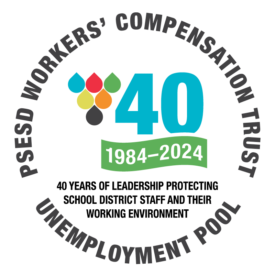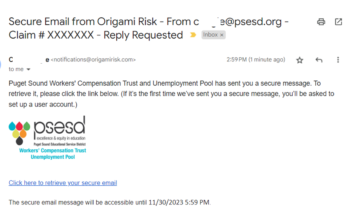School staff and students need and expect a safe, healthy and comfortable environment conducive to work and education. The quality of the indoor environment impacts people and their performance at different levels, and should be a high priority in our schools. However, indoor air quality (IAQ) is not black and white, it can be a complex problem, and there are few clear cut regulations to follow. That’s why the Puget Sound Workers’ Compensation Trust (Trust) offers IAQ support and expertise to member districts.
Basic facts about IAQ:
What is indoor air quality (IAQ)? IAQ refers to the air quality within and around buildings, especially as it relates to the health and comfort of building occupants. IAQ is affected by the quality of ventilation and matrix of air contaminants that are present. Optimum ventilation and source control of the chemical and biological contaminants are the primary methods for improving IAQ in most buildings.
How is a school environment different? Aside from some industrial work areas, classrooms are the only places where there are more than 20 people in a single, smaller room for extended periods of time. The cumulative effects of their body functions, hygiene habits, health issues, traffic patterns, activities, and the materials used in the room can add up fast. In the majority of cases, school IAQ problems are not due to the presence of some exotic toxins, not even excessive mold growth, but a matrix of smaller problems that add up to or even amplify each other. As a unique environment, classrooms need lots of attention and conscientious management to be kept healthy and contaminant-free.
Why have a school IAQ plan? A growing body of scientific evidence indicates that the air inside buildings (homes, offices, schools, etc.) can be more polluted than the outdoor air in even the largest and most industrialized cities. Other research indicates that people spend approximately 90 percent of their time indoors. If we add to this the demonstrated relationship between student performance and IAQ, it becomes clear that IAQ must have a high priority in our schools.
IAQ investigation: When staff members have concerns about indoor air quality, or assume that their health problems are tied to the building or room they work in, a competent, broad range investigation needs to be conducted. The investigation will address the following elements:
- Ventilation
- Sources of air pollution
- Communication
We recommend that each district set up a basic IAQ program headed by a well-informed contact person, who receives concerns and responds in a timely manner. The Trust’s industrial hygiene consultant is available to assist with building and enhancing your district IAQ program. She also provides assessments, investigations, problem solutions and education.
IAQ Education in Schools:
Educating staff and students on the real issues of Indoor Air Quality (IAQ) is one of the most important tools that districts can use to prevent and constructively solve IAQ issues. It is not unusual for individuals who believe that they are affected by the quality of the indoor environment to collect their information from poor resources, from the wrong web sites or “experts” who build their businesses with borderline practices. The Trust offers both preventive and problem solving education to all parties involved: the concerned staff member(s), their supervisors and colleagues, custodians, maintenance personnel and the administrative and technical staff at the districts. This can be included in almost any meeting or gathering, both at district and school level: periodic meetings of principals, staff or custodians, safety meetings, trainings, in-service days, or just an informal gathering of stakeholders. IAQ education does not only mean information on the science and technicalities of an IAQ investigation, but it offers ideas on how to make and keep classrooms healthier and more custodian-friendly, and as such reduce the incidence of allergies, asthma and other IAQ-related problems.
We encourage and support our member districts to recognize the importance of IAQ, implement a district-wide IAQ plan and address concerns in a timely and professional manner. Please contact the Trust’s Industrial Hygiene Consultant for IAQ support at [email protected] or 425-917-7640.
Recommended IAQ information sources:
- IAQ Coordinator’s Guide
- Mold Remediation in Schools and Commercial Buildings
- Environmental Public Health
- WA State Department of Health IAQ best management practices manual for schools: IAQ Best Management Manual
- WA State Department of Health’s “Responding to Indoor Air Quality Concerns in our Schools”: Responding to Indoor Air Quality Control Manual



